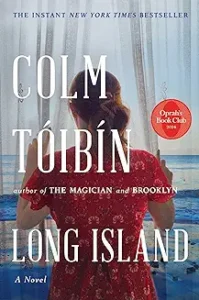Long Island by Colm Toibin 2024
Colm Toibin is one of the most honored and widely read of contemporary novelists. Irish, through and through, he has written novels, short stories, essays, and non-fiction earning honors on both sides of the Atlantic. Currently a Professor at Columbia, he was formerly the Chancellor of Liverpool University.
I had read, enjoyed, and admired two of his prior books, “Norah Webster” and especially “The Magician”, his retelling of Thomas Mann’s life. His “The Master”, a similar treatment of Henry James, perhaps his most important influence, remains on the ‘to be read’ pile in Vermont where it has sat for several years.
So, it was with great anticipation that I read “Long Island” though the sticker on the front of this library book indicating that it was an “Oprah’s Book Club selection” did raise some concerns. And concerned I was, when after 20 or so pages, I had failed to become engaged with the characters, the setting, or the plot. I stuck with it and soon became thoroughly immersed and engrossed, eager to find out what happened with the Irish-born Eilish and her Italian husband, Tony, and his extended family all living in a cul-de-sac on the eponymous island.
The story revolves around a visit by a man who informs Eilish that his wife is going to have a baby thanks to Tony, a plumber who evidently had been at least as interested in the wife’s plumbing as in her home’s. The man indicates that the baby will be brought to Eilish’s home, and Eilish resolves that will not be the case. How that conflict plays out is one of the central plot lines.
The other is a triangle love story involving the man Eilish had been in love with in Enniscorthy, the small town where she grew up in Ireland. her best friend Nancy Sheridan, and Eilish herself when she leaves Long Island for a visit to her motherwho is about to turn 80. The complex interplay between the two women and Jim Farrell is brilliantly written, but the book ends with it all still unresolved—an ending I found not very satisfying for this neatnik, obsessive reader. Ironically, in reading Toibin’s Wikipedia page, he is quoted as saying “Ending a novel is almost like putting a child to sleep – it can’t be done abruptly”, and yet, that is exactly what he has done in this book. To avoid having to write a spoiler alert, I will simply say that as the final sentence ends the book, Jim is standing alone in his hallway thinking that “Maybe tomorrow we would have some idea what to do.” Come on, man. Get a grip. Take charge. Do Something!
So, at the end of the day, I liked the book, but I didn’t love it. Toibin is a masterful writer and his ability to evoke a setting (especially, his native Ireland near Wexford), develop characters, and put together a story are unparalleled. This book, however, left me feeling incomplete, which perhaps was his goal given how complex life has been for him (gay, Irish but exiled, etc).



